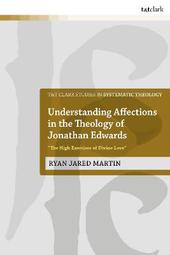
|
Understanding Affections in the Theology of Jonathan Edwards: "The High Exercises of Divine Love"
Paperback / softback
Main Details
| Title |
Understanding Affections in the Theology of Jonathan Edwards: "The High Exercises of Divine Love"
|
| Authors and Contributors |
By (author) Dr Ryan J. Martin
|
| Series | T&T Clark Studies in Systematic Theology |
|---|
| Physical Properties |
| Format:Paperback / softback | | Pages:296 | | Dimensions(mm): Height 234,Width 156 |
|
| Category/Genre | Christian theology
Theology |
|---|
| ISBN/Barcode |
9780567694867
|
| Classifications | Dewey:241.4 |
|---|
| Audience | | Professional & Vocational | |
|---|
|
Publishing Details |
| Publisher |
Bloomsbury Publishing PLC
|
| Imprint |
T.& T.Clark Ltd
|
| Publication Date |
20 August 2020 |
| Publication Country |
United Kingdom
|
Description
This volume argues that the notion of "affections" discussed by Jonathan Edwards (and Christian theologians before him) means something very different from what contemporary English speakers now call "emotions." and that Edwards's notions of affections came almost entirely from traditional Christian theology in general and the Reformed tradition in particular. Ryan J. Martin demonstrates that Christian theologians for centuries emphasized affection for God, associated affections with the will, and distinguished affections from passions; generally explaining affections and passions to be inclinations and aversions of the soul. This was Edwards's own view, and he held it throughout his entire ministry. Martin further argues that Edwards's view came not as a result of his reading of John Locke, or the pressures of the Great Awakening (as many Edwardsean scholars argue), but from his own biblical interpretation and theological education. By analysing patristic, medieval and post-medieval thought and the journey of Edwards's psychology, Martin shows how, on their own terms, pre-modern Christians historically defined and described human psychology.
Author Biography
Ryan J. Martin is Pastor of First Baptist Church of Granite Falls, MN, USA.
ReviewsThose who seek to engage with Edwards's theology, or who preach on Edwards's' take on these themes, cannot afford to miss this book. Martin has made a genuine and important contribution to the extensive community of scholars and pastors currently studying this great early 18th century pastor-theologian ... Martin's book is essential reading for understanding the theme of affections, so central to all of Edwards's thought. * Stellenbosch Theological Journal * Martin's work will be particularly valuable to two groups of people: Edwards scholars and Edwardsean pastors. * Puritan Reformed Theological Seminary * This volume and its conclusions are both erudite and compelling. I recommended it highly. * Detroit Baptist Seminary Journal * [This] is an important book for two primary reasons. First, it does a fine job explaining fully a crucial area of Edwards' thinking; second, it corrects misunderstandings that are prevalent in contemporary Christianity related to that area. What is this crucial area of Edwards' thinking? Affections. I've been waiting for a stand-alone volume that addresses this issue - and the contemporary misunderstanding and misappropriation of it by some parts of the church today - and am glad to see this book in print. * Josh Moody, College Church, USA * "Interest in Jonathan Edwards has experienced something of a resurgence recently among Evangelicals, yet treatments of Edwards's theology often fail to recognize his core anthropology, anachronistically equating his understanding of the category of affections with contemporary notions of "emotion." Ryan Martin provides the most comprehensive study of Edwards's thought on matters related to Christian affections, serving as a necessary corrective to contemporary treatments of one of America's most respected theologians." * Scott Aniol, Southwestern Baptist Theological Seminary, USA * "Jonathan Edwards predicates his argument in Religious Affections on the distinction between affections and passions. Contemporary writers who think only in terms of emotions typically fail to grasp the significance of this distinction, consequently losing much of Edwards's argument. Ryan Martin has done superior work in tracing the history of this distinction and teasing out its significance for Edwards. His work constitutes an important corrective to several current misconceptions." * Kevin T. Bauder, Central Baptist Seminary, USA *
|